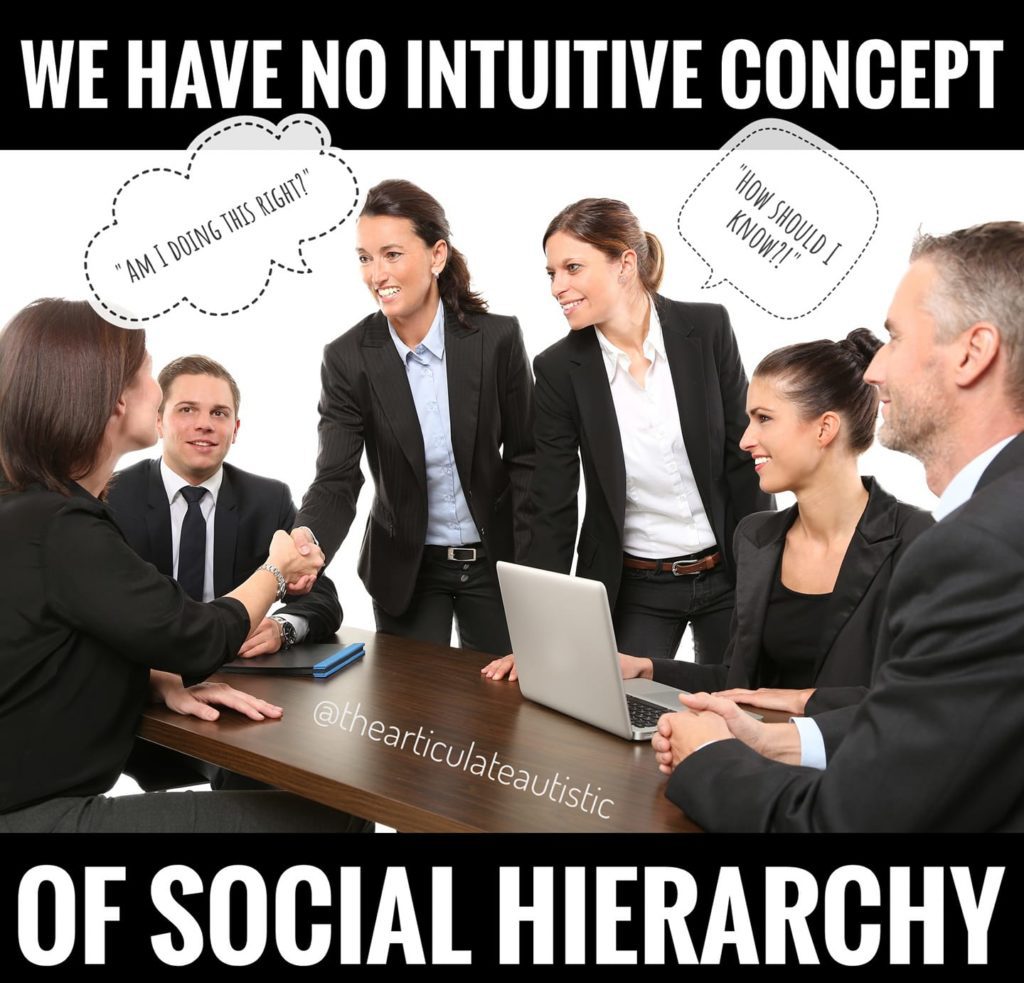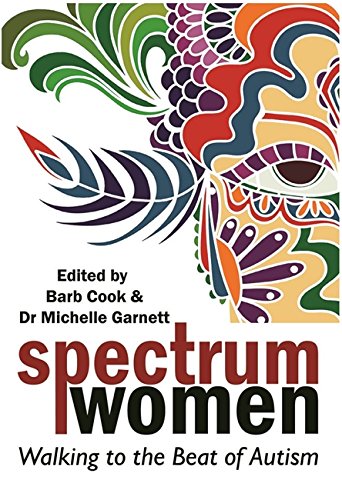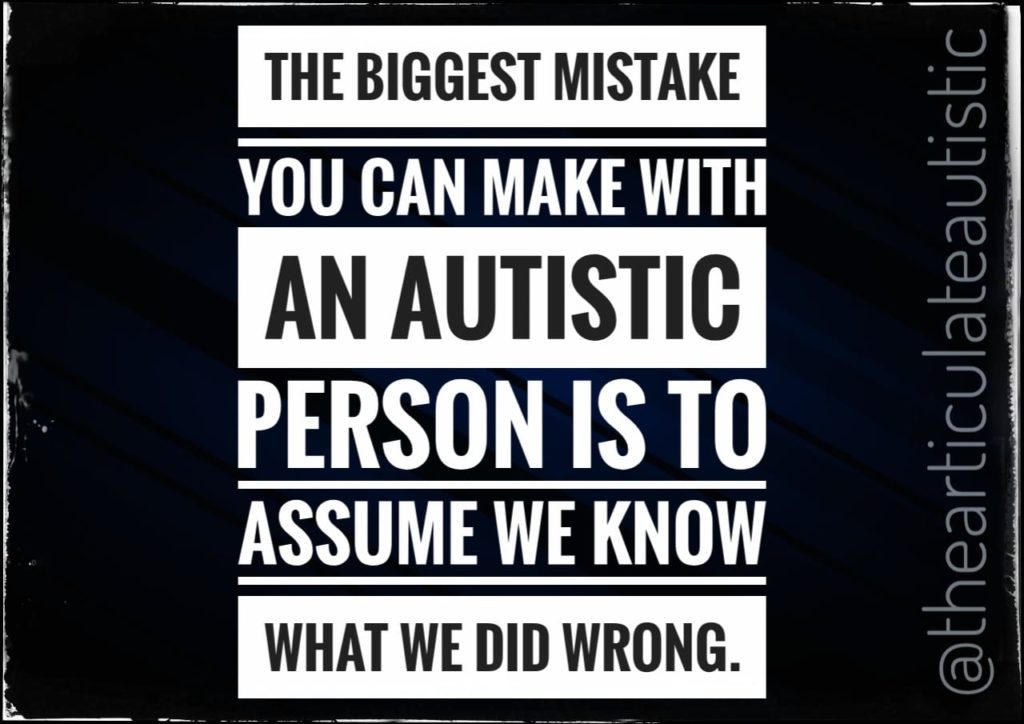We Have No Intuitive Concept of Social Hierarchy

In my last post, I talked about why it is so incredibly important to answer the question, “Why?” when an autistic person asks it. While I was explaining, one of the things I revealed is that autistic people rarely have an intuitive concept of social hierarchy.
In the neurotypical world, people just know that people who are considered to be an authority figure (parents, teachers, coaches, employers, clergy, etc.), are to be automatically treated with deference and respect.
(There are always exceptions to this, but as a rule, it’s true.)
People who are seen as equals (siblings, schoolmates, teammates, co-workers, and fellow parishioners, etc.), are treated differently. For example, more laughing and joking, more sarcasm, more humor, risque conversations about sex, religion, and politics. While these topics can cause arguments, they are seen as acceptable and “the norm”, for the most part.
Autistic people have no intuitive concept of social hierarchy. I say ‘intuitive’ because this is a skill we can learn, but it does not come naturally to us the way it does to neurotypicals.
(Article continues below.)
The best way to improve communication with your autistic loved one is to understand how your autistic loved one’s mind works! Intentions, motivations, and personal expressions (facial expressions or lack thereof, body language, etc.), are often quite different in autistic people than they are in neurotypical people.
Experience a better understanding of your autistic loved one by reading books about life from an autistic perspective as well as stories that feature autistic characters. You’ll have so many “Ah ha!” moments and start seeing your autistic loved one in a different light (and you’ll have a better understanding of their behaviors, which you may have been misinterpreting up until now).
Books I recommend for a better understanding of your autistic loved one:
This can cause serious miscommunication and unintentional abuse towards the autistic person, especially when the neurotypical person misunderstands the intentions of the autistic person to be that of disrespect.
To autistic people, there is no inherent difference between the CEO of a company or the janitor, a billionaire or a homeless person, an elder or a child. Everyone gets treated equally!
– Jaime A. Heidel
Which can actually be quite an innocent and beautiful concept, but it can also cause very awkward situations.
For example, an autistic person may make an off-color sexual joke to a friend on a Saturday night and then make the exact same off-color joke to their great aunt on Sunday morning in church.
Their innocent reasoning behind this is that it made their friend laugh, so it must be funny, so telling it to someone else will get the same response!
This is a critical error, but we have absolutely no clue unless we are told specifically and why it’s inappropriate to say certain things at certain times to certain people.
So, NTs, try to imagine this: You had a good experience with a friend the night before, and socializing is difficult for you. You were so proud to get a positive response that you can’t wait to get another one! Maybe you’re getting the hang of this social thing after all!
Then, you tell the joke again. Suddenly, an entire congregation is staring directly at you in open-mouthed shock and disgust. They all begin scolding you at once, and you feel so confused and horrible, you wish a church pew would open up and swallow you whole.
The feelings we experience at moments like this would be akin to a neurotypical person getting hit in the stomach with a bowling ball while riding a rollercoaster upside down in 110 degree heat with 5 different songs from completely different genres blasting in their headphones all at once!
Many autistic people have had an incredible amount of these colossal misunderstandings that have eventually lead to us developing PTSD because the reactions of others were not only the exact OPPOSITE of what we expected, said reactions are often loud, confusing, and disorienting and are sometimes accompanied by verbal and physical abuse.
This is why explaining, being specific, and answering those “why” questions are SO important. It’s also why it is never a good idea to assume the autistic person in your life knows what they are saying or doing is inappropriate!
These situations are going to come up, no matter how much explaining you try to do to prevent it, so try to look at it a different way.
One, it may be embarrassing (but it’s sometimes kind of funny), and, more importantly, these moments can be used to teach and explain what is considered inappropriate and not in neurotypical society (so a total stranger doesn’t someday beat us up in an alley because we’ve continued the behavior into adulthood).
Great Aunt Edna will recover from the off-color joke told right in the middle of Sunday Mass. The autistic person who unknowingly made said joke in the wrong company will not be so lucky if they are screamed at and treated like they did it on purpose.
Yes, I’m sure there are autistic people in the world who WOULD do something like that on purpose, but I truly think it’s rare. In any event, the best response you can have is to assume innocence and teach, especially if this is the first time it’s happening.
Follow me on Instagram.
Want downloadable, PDF-format copies of these blog posts to print and use with your loved ones or small class? Click here to become a Patreon supporter!








Hello, I have autism, and I personally disagree with “Autistic people have no concept of a social hierarchy”
When I was in elementary school, I drew a graph explaining the “social hierarchy” at my school, based off of who was hung out with more at recess. I am also someone who uses very formal language with doctors and professors, knowing it took a lot of work for them to get their credentials.
Difficulty understanding it at times? Maybe. No concept of one? Absolutely not, for me at least.
Oh, I definitely think it can be learned! I just don’t think we have an intuitive, innate concept of it that way neurotypical people do.
Actually recent studies have shown that autistic people have a greater sense of social hierarchy than neutypical people. I’ve attached a study below, published in 2019.
https://www.nature.com/articles/s41598-019-52211-8
From what I understand of this study (and it’s not much because I can’t read scientific studies well), it looks like autistics are different in the way we perceive social hierarchy instead of us having a better concept of it? I think there are a lot of factors in play when it comes to the understanding of social hierarchy, including trauma. Since there are few untraumatized autistic people, I would venture our ability to pick up on certain social cues such as crossed arms or hands on hips as possible signs we are about to be abused in some way, so we have memorized how to avoid people who show these signs or appease the people we can’t escape to result in the same effect. I’m not arguing with the study, I just think there’s more to it.
I agree with all 4 comments. We understand social hierarchy from a sort of birds eye view, we see the components but it is certainly harder for us to intuitively integrate social hierarchy into our being, often having to intellectually simulate our responses in correspondence with former reactions we have received from a similar person, or group of people, in a similar social (class, race, age, family, friends, authoritative, colleagues etc.) standing, before responding as intuitively we tend to treat everyone exactly the same. It does not come as “naturally” as it does with neuro-typicals. I often feel like I live in a fake world because I see people “acting” differently around different people, very confusing but at the same time intriguing.
I’m autistic and I don’t understand WHY NT’S are so offended that even though people who have worked hard to get where they are should be commended for having done so, the CEO isn’t automatically better than the janitor. Especially if the CEO is a conceited, mean person and the janitor is kind and would do anything to help someone. I judge a person according to their personality. Yes, I would be more formal to a person in a high position, but I believe everyone deserves respect UNLESS they are disrespectful themselves.
As a teacher, I can tell you that few children understand the concept of hierarchy. Child-centred parenting and teaching practices mean than many children only experience democratic relationships until they get their first jobs. They are often shocked and outraged to find that teachers are in charge and can give them instructions because their parents do not.
That’s because it’s stupid, and children understand that. Adults can more successfully manipulate people. As a child it made zero sense to me why I should obey commands when there is no goal outside of the control of myself by another. Hierarchical systems, including those within schools are not democratic systems or relationships. There is no choice, no vote, only commands. Let’s not call it something it’s not.
This right here. <3
I understand what you’re saying, but my explanation of how I experience this is different.
Yes, I have issues the unfairness of treating people differently due to their place in the social hierarchy, but that’s not the problem in the moment.
Usually problem in the moment is having to memorize and recall a thick catalog of specific behaviors that are supposed to be displayed.
This is definitely an issue, especially when you have no choice but to mask. We spend more time making sure we are “performing” correctly than actually paying attention and doing what we are being asked to do. It’s so frustrating. If you (whoever the “you” is in that moment) just let me look “angry”, I can do what you asked me to do because I don’t have to focus on what my face is doing. *sigh*
I hate hierarchies.
I’m tired of reading things like ‘struggle to understand hierarchies’ or any other type of statement that makes this a negative thing. Social hierarchies are not something I have any difficulty understanding. I have no interest in them, nor believe that they serve any progressive purpose. Social behavior is primitive behavior, is rooted in selfishness, acts as a support system for war, human exploitation. They’re very simple and that’s the problem.
Well, I wrote that a while ago, but I stand by it. I realize now that many autistic people DO understand social hierarchies yet choose not to follow them. I, however, needed to be explicitly taught they existed. I did not know.
I had to have them explained, I tried to follow them, following didn’t make sense (there were always conflicts between what people claimed like support for DEI policies within a strict European-style hierarchy), and then I gave up on trying to follow these arbitrary hierarchies.
Does make some jobs possible, as some companies only want silent obedience to hierarchy and don’t see productivity, collegiality, honesty, etc as having any benefit.